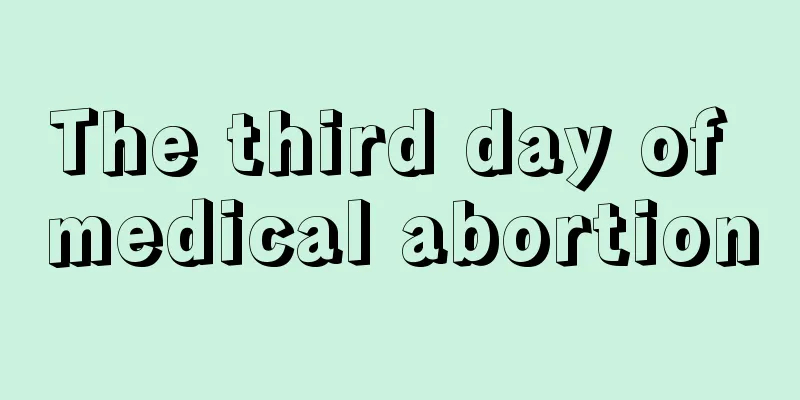Dietary considerations for postpartum uterine curettage

|
Today's medicine is much more developed than outside, so people have become particularly demanding. After giving birth, many people will undergo postpartum curettage. They need to stay in bed for a few days after the operation. After all, the body is very weak and it is not suitable to walk around casually. They also need to pay attention to their diet. So what exactly do you need to pay attention to in your diet? Dietary Note: The patient's diet should have higher calories, especially providing protein, multiple vitamins and inorganic salts with higher physiological value, and especially supplementing iron and sufficient water. You should eat more nutritious foods that are easy to digest and absorb. You can choose fresh fish, chicken, eggs, liver, animal blood, lean meat, soy products and milk, fresh vegetables and fruits. The staple food should first be liquid or semi-liquid food, such as milk, rice porridge, and noodles; then add rice, steamed buns, dumplings, etc. Steaming is the best cooking method, which makes the food fragrant, tender and delicious and easy to digest. In the first few days after the uterine cleaning, you should drink more soups, porridge, and drink more water. You can also stew hen soup, pork rib soup, and three-fresh soup for drinking. Spicy and other irritating foods should be avoided. In the first week after miscarriage, you can have 1 to 2 extra meals a day; after one week, you can return to three meals a day. Dietary adjustments should focus on the following points: 1. Protein should be supplied at 1.5 to 2 grams per kilogram of body weight. Therefore, you can eat more chicken, lean pork, eggs, milk, beans, and bean products. 2. As the body is weak and prone to sweating, it is advisable to replenish water in small amounts and multiple times. A large amount of water-soluble vitamins are excreted in sweat, especially vitamin C, vitamin B1, and vitamin B2. Therefore, you should eat more fresh vegetables and fruits. This also helps prevent constipation. 3. On the basis of a normal diet, appropriately limit fat. Within one week after surgery, fat should be controlled at around 80 grams per day. People with menstrual disorders should avoid eating irritating foods, such as chili peppers, wine, vinegar, pepper, ginger, etc. These foods can stimulate congestion of the sexual organs and increase menstrual volume. Also avoid eating cold foods such as crabs, snails, and clams. Some doctors recommend taking 3-5 doses of Shenghua Tang (6 qian of Angelica sinensis, 1.5 qian of Roasted Licorice Root, 4 qian of Chuanxiong, 1 qian of Peach Kernel, 1 qian of Black Ginger, and 2 qian of Eucommia ulmoides). Here are a few more recommended recipes: 1. Soy milk rice porridge: 2 bowls of soy milk, 50 grams of rice, and appropriate amount of white sugar. Wash the rice, cook it with soy milk to make porridge, and add sugar after it is cooked. Take on an empty stomach every morning. It has the effect of harmonizing the spleen and stomach, clearing away heat and moistening dryness. 2. Egg and date soup: 2 eggs, 10 red dates, and appropriate amount of brown sugar. Put water in a pot and bring it to a boil, then beat in the eggs and cook them. When the water boils again, add red dates and brown sugar and simmer for 20 minutes. It has the effects of tonifying the middle, replenishing qi and nourishing blood. Suitable for conditioning of anemia and deficiency of Qi and blood after illness and childbirth. 3. Ginseng and Astragalus hen: 1 old hen, 50 grams of Codonopsis pilosula, 50 grams of Astragalus membranaceus, 50 grams of Chinese yam, 50 grams of jujube, and appropriate amount of rice wine. Kill a hen, remove its feathers and internal organs, and soak it in rice wine. Place the other four ingredients around the chicken, steam it, and take it in several servings. It has the effect of invigorating qi and nourishing blood. 4. Carp among fish can promote uterine contraction. The above introduces to us what we should pay attention to in diet after postpartum curettage. Diet is very critical. You should not eat too spicy food after the operation, otherwise it is likely to cause constipation and stomach digestion. |
<<: How much bleeding does the hymen rupture?
>>: Why does the transparent vaginal discharge increase?
Recommend
What are some tips for treating dysmenorrhea?
Dysmenorrhea is a common problem for women, but i...
26 Week Induction of Labor
If a woman wants to have an induced abortion at 2...
What should mothers pay attention to when weaning
Nowadays, more and more young people choose to br...
Bleeding after sex feels like menstruation, what's going on?
Why does bleeding after intercourse feel like men...
【Health Lecture】Gastrointestinal discomfort is actually caused by anxiety
Recently, we received a patient like this in the ...
Gigya: The Google+ friend sharing rate was only 2% from April to June 2013
A major UI overhaul and an increase in user numbe...
Four dangerous conditions of heavy menstrual flow
Increased menstrual volume: Menstrual volume 80ml...
There are two inflammation test papers
For women, if they have some gynecological diseas...
How big is the belly at 22 weeks
Pregnant mothers are very sensitive and curious a...
The process of induced abortion at 5 months of pregnancy
When you are five months pregnant, the month is a...
How to regulate high testosterone levels in girls
If the estrogen level in the female body is too h...
Is uterine inflammation serious?
Uterinary inflammation is a relatively serious gy...
Drinking alcohol and getting red on the face! Is the "Asian flush" an evolutionary "defect"?
Leviathan Press: Do you get flushed when you drin...
NetQin released its 2015 Q1 financial report, with net revenue exceeding expectations and an increase of 11.8% year-on-year
On May 20, Beijing time, NetQin released its unau...
What are the benefits of practicing Ba Duan Jin? Is Ba Duan Jin Qigong?
Ba Duan Jin is an independent and complete set of...









